AI Engines and Freshness: How Often to Update

Summary (TL;DR)
AI search engines now elevate fresh content far above outdated pages, with studies showing AI prefers sources that are 25.7% fresher than traditional Google results[[3]](https://seositecheckup.com/articles/ai-loves-fresh-content-how-to-keep-your-blog-posts-relevant-and-cited). For optimal performance, marketing and SEO consultants should audit and update top pages quarterly, monitor “last modified” signals, and maintain ongoing freshness for news, reviews, and high-value content. Data proves that sites updating at least 9+ times monthly see a 20%+ organic traffic uplift and dramatically higher chances of appearing in AI-assisted queries[[10]](https://duellingpixels.com/blog/content-social-media/achieve-2025-seo-success-with-consistent-content-updates/).
---
Introduction
With the rapid rise of generative AI platforms such as ChatGPT, Gemini, and Google’s AI Overviews, content freshness has evolved from a secondary SEO concern to a strategic priority. AI citation datasets reveal an irrefutable trend: AI engines systematically surface newer, freshly updated content over older references, regardless of historical authority[[3]](https://seositecheckup.com/articles/ai-loves-fresh-content-how-to-keep-your-blog-posts-relevant-and-cited)[[4]](https://explodingtopics.com/blog/freshness-impact-calculator). As Google applies sophisticated freshness signals and query intent modeling, updating frequency and methodology directly shape brand visibility, user trust, and ROI.
For agencies and consultants managing client digital strategies, failing to prioritize content recency will compromise reach, conversions, and relevance in an AI-first search landscape. This post explains the mechanics behind AI freshness bias, offers actionable update schedules, and provides the data you need to win in the evolving search ecosystem.
---
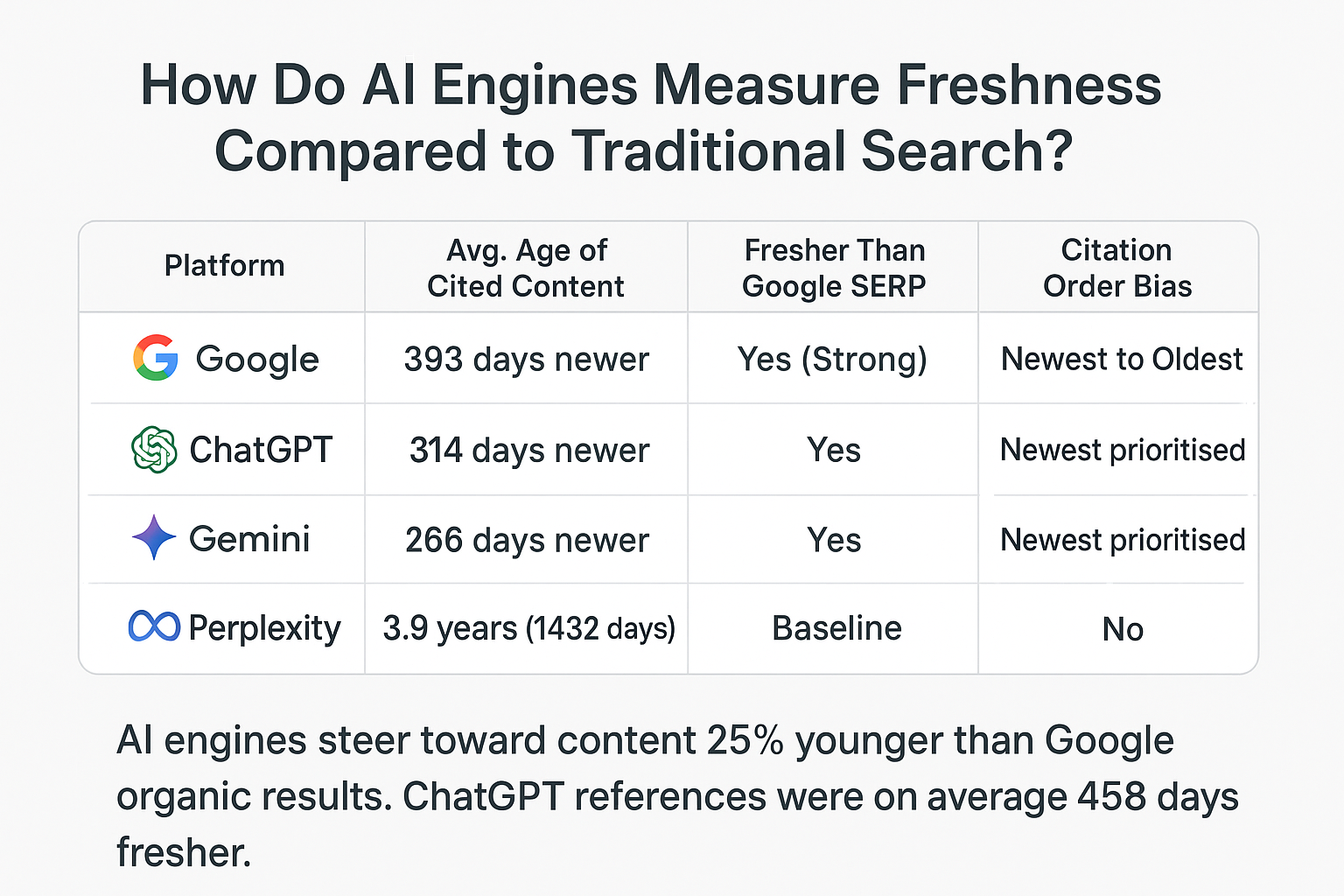
How Do AI Engines Measure Freshness Compared to Traditional Search?
A landmark study covering 17 million AI assistant citations found that:
| Platform | Avg. Age of Cited Content | Fresher Than Google SERP | Citation Order Bias |
|---------------------|--------------------------|-------------------------|--------------------|
| ChatGPT | 393 days newer | Yes (Strong) | Newest to Oldest |
| Gemini | 314 days newer | Yes | Newest prioritised |
| Perplexity | 266 days newer | Yes | Newest prioritised |
| Google Organic | 3.9 years (1432 days) | Baseline | No |
- AI engines steer toward content 25% younger than the top Google organic results[[3]](https://seositecheckup.com/articles/ai-loves-fresh-content-how-to-keep-your-blog-posts-relevant-and-cited).
- ChatGPT references, in particular, were on average 458 days fresher in their citation lists than the Google baseline.
- AI Overviews place extra weight on content with the most recent “last updated” signals, using byline date, syntactic date (e.g., year in URL/title), and semantic analysis[[4]](https://explodingtopics.com/blog/freshness-impact-calculator).
Action: Never let core pages go more than 90 days without a review—even evergreen content. In fast-moving niches, target updates every 30 days.
---
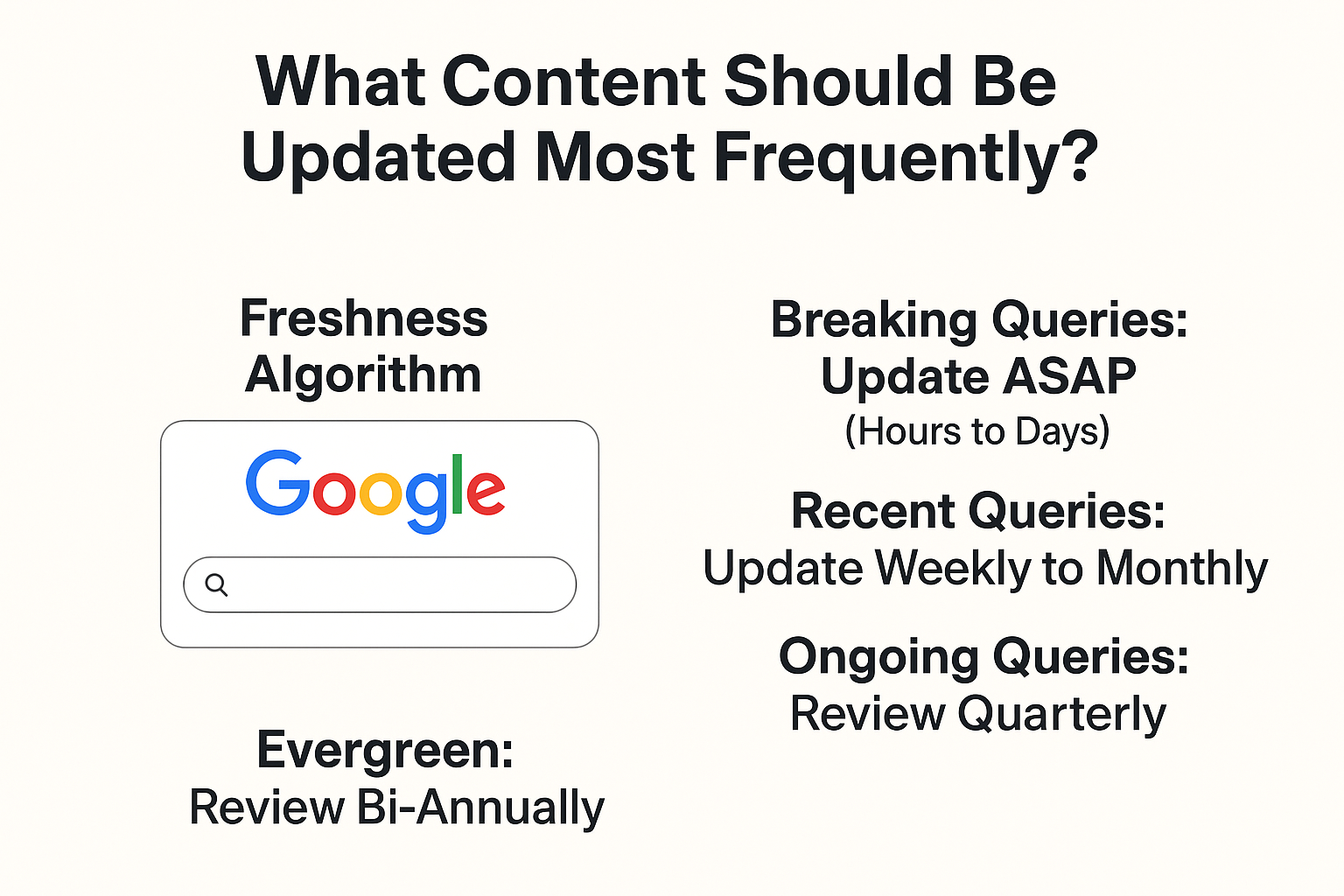
What Content Should Be Updated Most Frequently?
AI and Google’s Freshness Algorithm sort queries by time sensitivity using the Query Deserves Freshness (QDF) model[[10]](https://duellingpixels.com/blog/content-social-media/achieve-2025-seo-success-with-consistent-content-updates/):
- Breaking queries: News, events, viral stories (update ASAP; hours to days)
- Recent queries: Product launches, reviews, ongoing developments (update weekly to monthly)
- Ongoing queries: Market trends, recurring analysis (review quarterly)
- Evergreen: Stable resources, foundational guides (review bi-annually, update as needed)
Examples:
- News story on an AI algorithm leak: Review daily until coverage slows.
- 2025 SEO tool list: Update monthly for new entrants.
- Ultimate guide to keyword research: Audit every 3–6 months.
Action: Develop a content refresh calendar. Segment inventory by query type and set review and update deadlines accordingly.
---
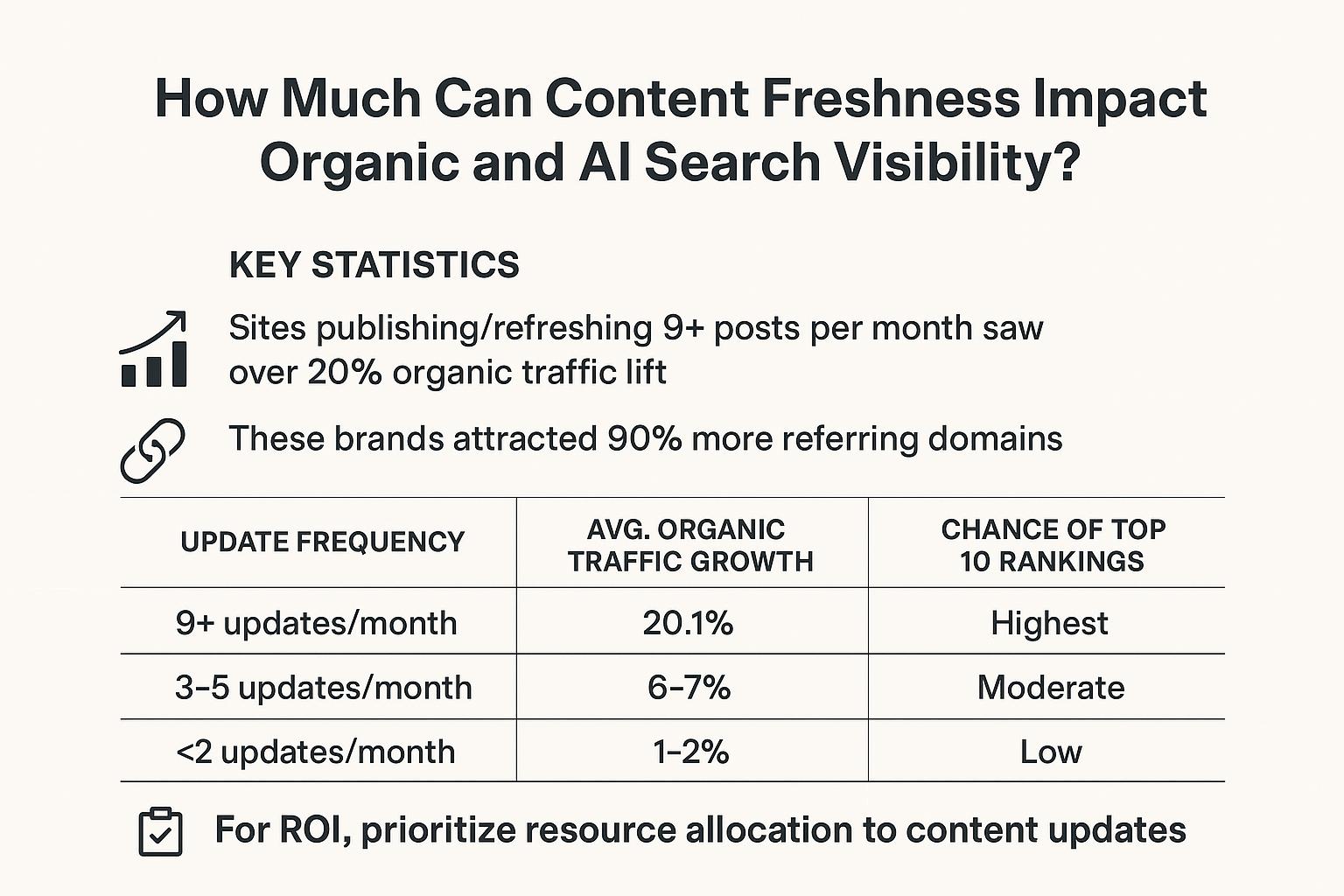
How Much Can Content Freshness Impact Organic and AI Search Visibility?
Data from the Stratabeat 2025 B2B SaaS SEO Performance Report[[10]](https://duellingpixels.com/blog/content-social-media/achieve-2025-seo-success-with-consistent-content-updates/):
- Sites publishing/refreshing 9+ posts per month saw over 20% organic traffic lift.
- These brands attracted 90% more referring domains and surged ahead in keyword coverage.
- Regular updates amplify opportunities for social engagement, authority building, and AI citations.
| Update Frequency | Avg. Organic Traffic Growth | Chance of Top 10 Rankings |
|-----------------------|----------------------------|---------------------------|
| 9+ updates/month | 20.1% | Highest |
| 3–5 updates/month | 6–7% | Moderate |
| <2 updates/month | 1–2% | Low |
Action: For ROI, prioritize resource allocation towards content review and update cycles with clear traffic and ranking KPIs per segment.
---
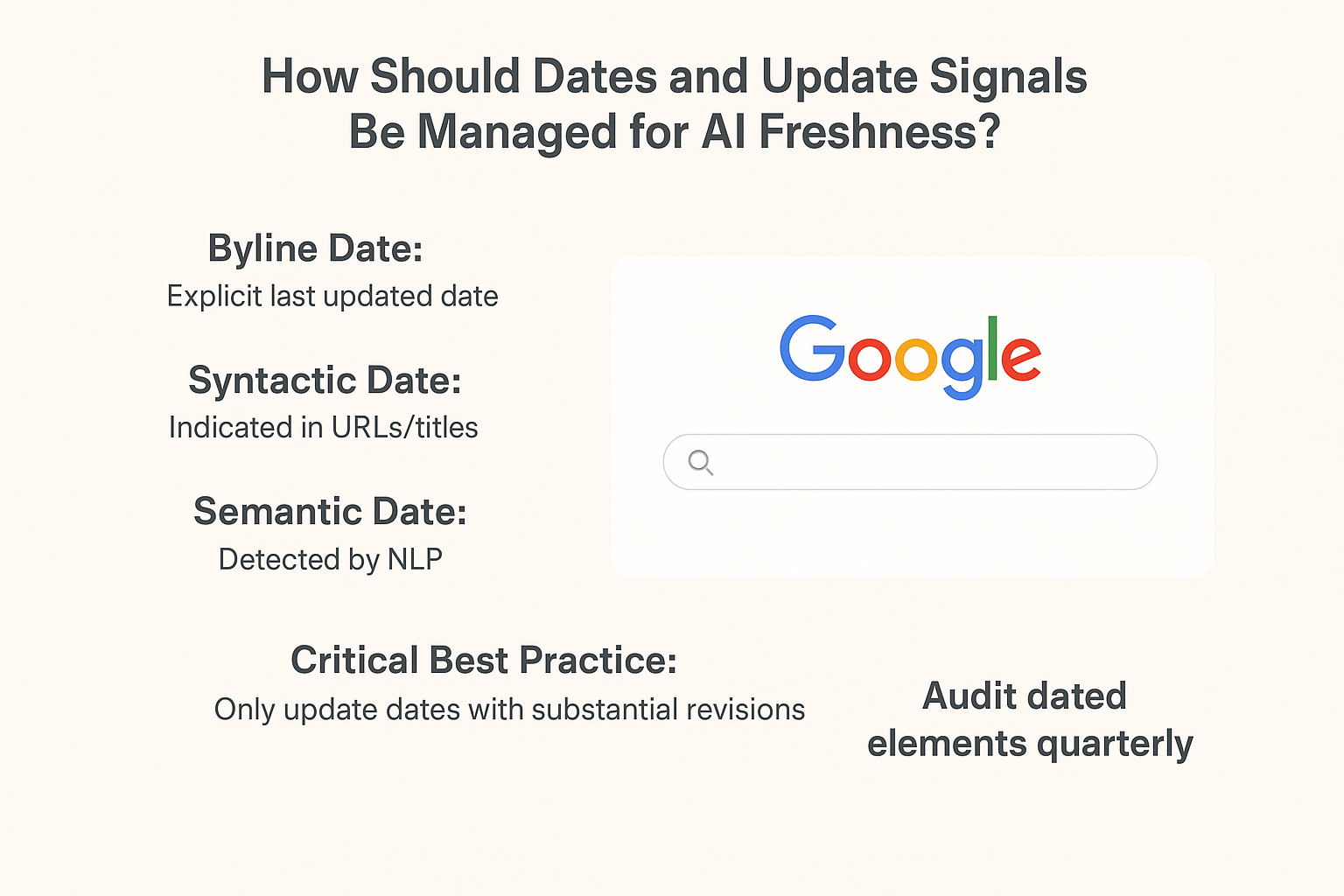
How Should Dates and Update Signals Be Managed for AI Freshness?
AI and Google pick up three distinct freshness signals from your site[[4]](https://explodingtopics.com/blog/freshness-impact-calculator):
- Byline Date: Explicit last updated date; must reflect meaningful change.
- Syntactic Date: Indicated in URLs/titles (e.g., “2025 SEO Trends”).
- Semantic Date: Detected by NLP; signals real-world topicality.
Critical best practice: Only update “published” or “last modified” dates when substantial revisions are made. Cosmetic changes without real edits can harm both credibility and visibility[[3]](https://seositecheckup.com/articles/ai-loves-fresh-content-how-to-keep-your-blog-posts-relevant-and-cited).
Action: Audit dated elements quarterly. Sync CMS and schema (e.g., Article.modifiedTime) with substantive updates.
---
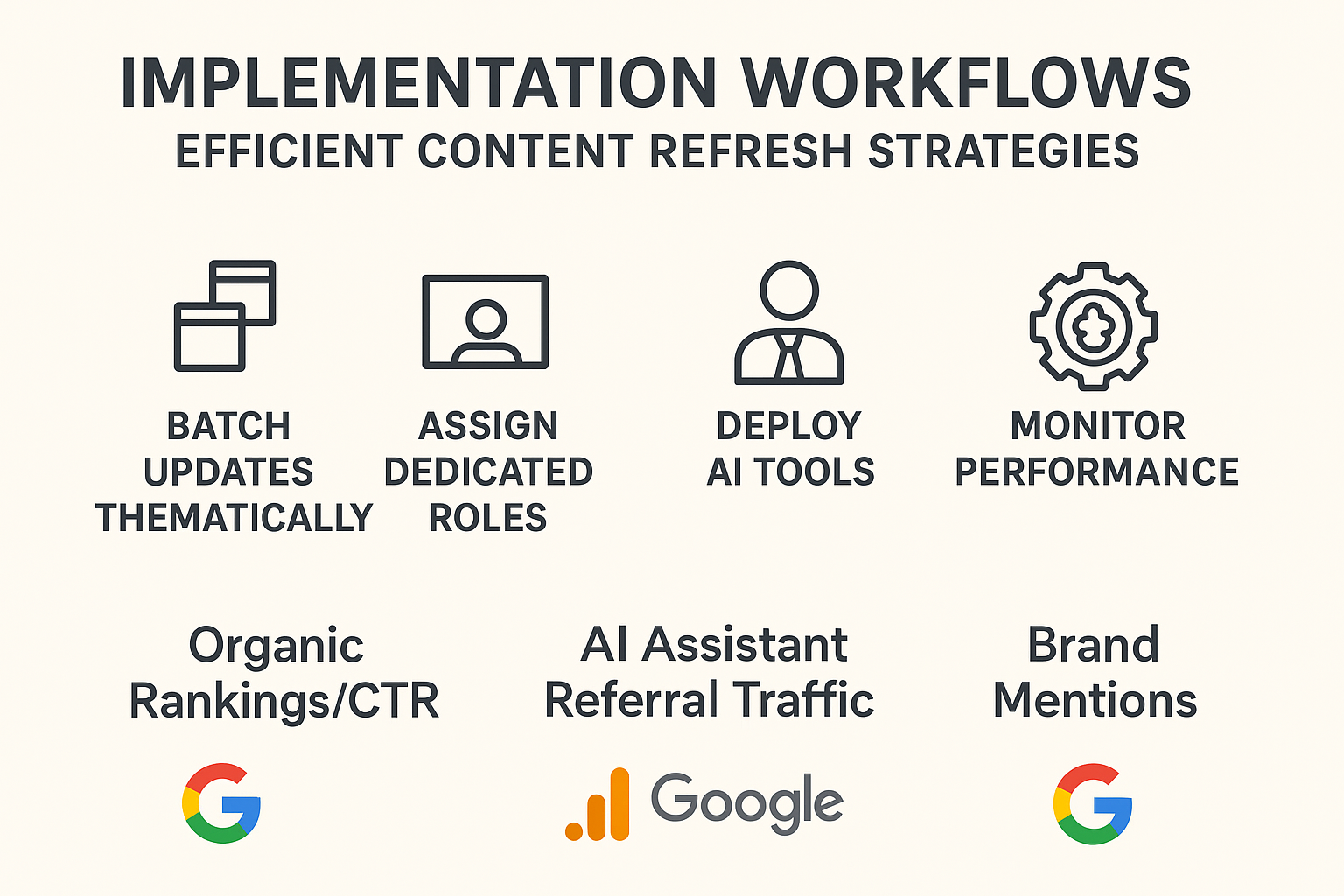
Implementation Workflows: Efficient Content Refresh Strategies
Marketing teams should approach updates through systematic batching and auditing[[3]](https://seositecheckup.com/articles/ai-loves-fresh-content-how-to-keep-your-blog-posts-relevant-and-cited)[[10]](https://duellingpixels.com/blog/content-social-media/achieve-2025-seo-success-with-consistent-content-updates/):
- Batch updates thematically (e.g., refresh top-performing listicles in Q1, how-tos in Q2).
- Assign dedicated roles: writer researches, editor validates, designer manages visuals.
- Deploy AI tools for automated intro rewrites, stat updates, and addition of emerging keywords.
- Monitor performance after updates via:
- Organic rankings/CTR
- AI assistant referral traffic (track via Google Analytics)
- Brand mentions in citation tracking tools
Action: Use data to prioritize pages for update, focusing first on traffic drivers and revenue-generating content.
---
Conclusion/Key Takeaways
- AI engines rank fresh content higher, systematically favoring updates over static assets.
- Analyze your site by query type and segment content by freshness need using QDF categories.
- Real-world data proves quarterly updating of core assets and frequent news refreshes deliver significant traffic, authority, and AI visibility benefits.
- Never fake freshness signals; only update visible dates after substantive change.
- Employ a structured updating workflow and leverage AI automation to maintain recency without sacrificing quality.
---
FAQs
How often should I update evergreen content for AI visibility?
Review core evergreen assets every 3–6 months, update if new data, trends, or tools emerge. Minimum: bi-annual review.
Does updating old content count as much as publishing new posts?
Yes—substantive rewrites to existing high-traffic pages, including fresh stats, examples, and links, can yield strong ranking and AI citation improvements.
Which types of pages require the fastest updates?
Time-sensitive content such as news, recent developments, and product comparisons. These can benefit from weekly or even daily updates.
How can I track if my updates are helping with AI citations?
Monitor brand mentions in tools like Ahrefs and BuzzSumo, and watch sources of referral traffic in Google Analytics to identify upticks from AI platform queries.
What are some signs my pages are losing freshness authority?
Drops in rankings, decreases in CTR, fewer brand mentions in citation tools, and declining engagement are key signals to refresh.
---
Citations
- How generative engines define and rank trustworthy content
- AI Engine Optimization (AEO): Preparing for the AI-First Search Era
- AI loves fresh content: How to keep your blog posts relevant and cited
- Fresh Content for SEO | Predict Your Freshness Impact
- AI Search Optimization: Staying Relevant and Visible in the Zero ...
- Answer Engine Optimization (AEO): Your Complete Guide to AI ...
- AI Search Engine Optimization: How to Rank in AI Search Results ...
- Content Recency and SEO: What You Need to Know - Alli AI
- Generative Engine Optimization vs. Traditional SEO for Developers
- Achieve 2025 SEO Success with Consistent Content Updates